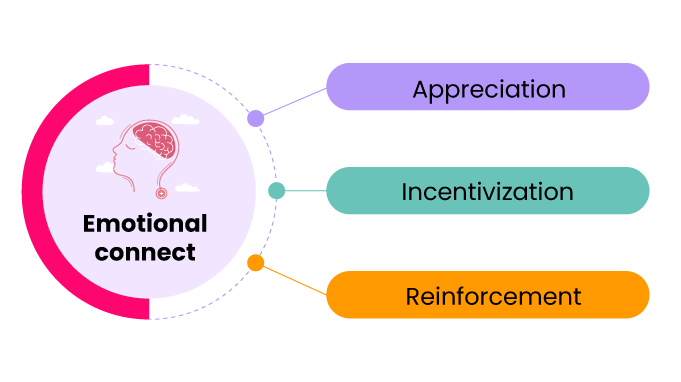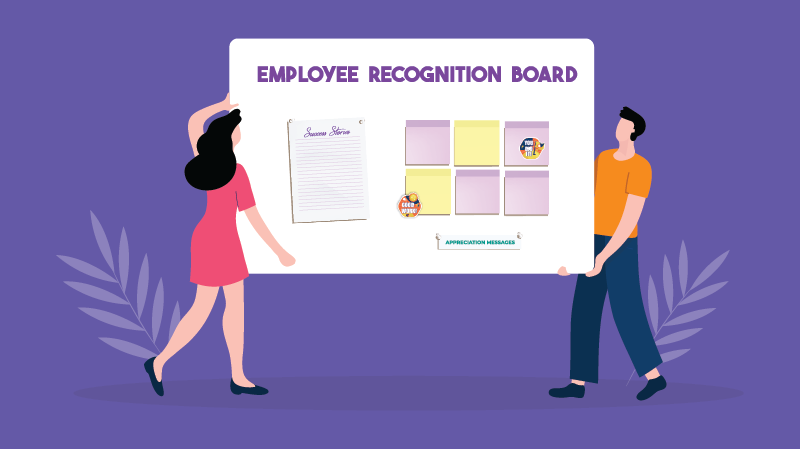9 Mistakes To Avoid In Your Employee Recognition Program
Employee recognition should be an integral part of your company’s overall strategy. When done right, it will drive your company to the next level.
But that doesn’t mean that any employee recognition program will do the trick. In fact, an ineffective program will do more harm to your business than good.
Still don't believe us? Here are some statistics that show why a culture of recognition is so important:
-
53% of employees say they would stay longer in a company if they feel appreciated. (Source: Glassdoor)
-
72% of businesses agree that recognition impacts engagement positively. (Source: HBR)
-
Companies with recognition programs experience 28.6% lower frustration levels than those without. (Source: SHRM/Globoforce)
Thus, employees are happier, more engaged, and stay on longer when they receive meaningful recognition.
Now the question is: Are you doing it right?
It is crucial to not fall into the trap of implementing reward and recognition strategies that don’t work.
Below are the common mistakes that companies make while designing their recognition programs.
9 Common Mistakes In Existing Employee Recognition Programs
1. Ill-defined objectives

Companies fail to hit the mark with their recognition programs because they don't define clear objectives. What do you want to achieve through your recognition program?
The objectives can differ according to your company's needs. Do you want to shape a vibrant culture of appreciation in your company? Are you focused more on engaging a remote workforce? Or perhaps you want fair awards for every employee.
When setting objectives for recognition programs, be specific about what you want to achieve.
A bigger problem arises when the objectives are not aligned with organizational values.
For example, your mission indicates you value teamwork. But you keep on rewarding employees for their individual success. This may derail the collaborative spirit you expect from your employees.
2. Unclear, irrelevant criteria for rewards
Another problem with recognition programs is not having any specific criteria for recognition.
The program can become random and meaningless if you recognize anything and everything. With no clear definition of ‘good’, you risk reinforcing the wrong behaviors.
You should specify the set of behaviors that you expect from employees. This way, they'll follow the right direction and work towards their goals.
3. Rewarding only performance
Appreciation is not just about acknowledging high performance or extraordinary results. It can also be for things like day-to-day tasks and teamwork efforts.
Performance-based recognition programs tend to stifle some essential qualities of an ideal employee. Qualities like integrity, punctuality, teamwork also need to be encouraged.
Here are some recognition-worthy behaviors that goes beyond performances:
- Reliability and integrity
- Emotional Intelligence
- Teamwork
- Consistency in performance
- Creativity
- Adaptability and quick learning skills
- Commitment to work
- Mentoring skills
- Punctuality
4. Infrequent rewarding

A mistake that companies make while giving recognition is not being regular and consistent.
Sporadic recognition gives little opportunity to employers to acknowledge daily efforts. Employees may feel overlooked, which will bring down their motivation to work.
Every effort, big or small, should be appreciated at the right time. It might not be very fruitful to recognize an employee for something they did months ago.
5. People getting left out
Recognizing top performers can help motivate and boost morale in the company. But it can also make other employees feel undervalued. They will put in even less effort, lowering the overall productivity. People may feel alienated from the rest of the workforce if they are not given due appreciation.
So design an inclusive recognition program that genuinely acknowledges every effort.
6. Having only yearly awards
Annual employee recognition programs might not be enough to boost everyday morale. You’d want your employees to be motivated and committed throughout the year. You'd want a culture that supports the smallest efforts to the biggest of accomplishments.
An effective employee recognition program rewards employees weekly, biweekly, or monthly. In short, they run regularly and thus, keep the employees motivated.
7. Not personalizing awards

Recognition programs that use a one-size-fits-all approach can fall flat. Giving standardized gifts might not be enough for impactful recognition.
The whole point of employee recognition is to make employees feel special. And what motivates one employee won’t necessarily motivate others. Some people like hand-written notes, while others prefer public recognition.
Learn what makes your employees tick and incorporate that into how you appreciate them. If you go that extra mile to connect with them, it will make the reward more meaningful.
8. Focusing only on top-down recognition
Leaders praising employees can impact morale considerably. But focusing solely on top-down recognition might not be enough.
You see, leaders may not know the details of what an employee does all day. There may be cases where deserving candidates didn't get the reward. It can breed resentment and foster a sense of disconnect with the company.
On the other hand, peers notice efforts and understand employee contribution much more than leaders. When they appreciate their teammates, it strengthens work relationships. Also, employees develop trust in the rewarding system.
Thus, peer-to-peer recognition is crucial to building a vibrant culture of appreciation.
9. Not making recognition visible
Companies might plan great recognition programs: spot awards, shout-outs, bonus programs. But if there is no visibility of who is recognized, it is not good for your culture.
Social recognition validates to the employee that you appreciate them, making the awards genuinely worth pursuing. So make the award announcements loud and public.
Building A Reward And Recognition Strategy That Works
We saw why your employee recognition program might not be working. Now it’s time to make things right.
But it is crucial to note that every company is unique. There can be no one-size-fits all approach to rewards and recognition. Thankfully, the basics of building a recognition-rich company culture are quite consistent.
Here are the two key things to build into your reward and recognition strategy:
1. Measure the reward and recognition pulse of your company
Your employee recognition program is up and running. But it'll fall flat if you don’t assess its performance. Consider the following questions:
- Do your employees like the rewards?
- Is it impacting engagement levels positively?
- Are your employees motivated to be more productive?
You need to constantly evaluate such questions and get them right.
Follow up on how employees feel about the program. Get their feedback about the recognition experience and ask for suggestions.
Employee surveys and check-ins are of enormous help to gauge engagement levels.
2. Use a powerful framework to evaluate and design your R & R program
The best recognition programs are personalized, authentic, and impactful. They are easy to understand, consistent, and fair to all.
All these require a clear strategy right from the get go.
We have a brand new framework to help you design such a program: the AIRe Framework for Employee Recognition.

AIRe is a powerful tool that helps companies design and boosts their recognition programs. It uses the fundamental drivers of human motivation to make recognition effective.
The framework is based upon Appreciation (A), Incentivization (I), and Reinforcement (R) as the key tenets of recognition, with Emotional Connect (e) as the driving force.
It will help you get deeper insights into questions like:
- Are you clear on the behaviors you want to reinforce?
- Do your employees know the guidelines about the program?
- Are you recognizing your employees personally and consistently?
- Are they motivated by the incentives you give?
Using this framework, you can assess how you stack up against the best in the industry and build an unforgettable recognition experience.
Read more about the AIRe framework here.
Way Forward
An authentic and impactful employee recognition program has numerous advantages. It has an unparalleled positive impact on the employee experience that will ultimately have a dramatic effect on the company’s bottom line.
The mistakes listed above are common and easy to make. Avoiding them may appear to be time-consuming, but the benefits far exceed the drawbacks in the long run.
The key is to empathize with the employees. You need to put yourself in their shoes and think about how you’d like your company to recognize you.
You can adopt the AIRe principles to review their employee recognition programs. Its structured approach repeatedly reinforces company values through the defined metrics.
Any good R&R platform, such as Vantage Rewards, will help mitigate the problems mentioned above and present you with a seamless recognition experience that conforms to your organizational needs.


















